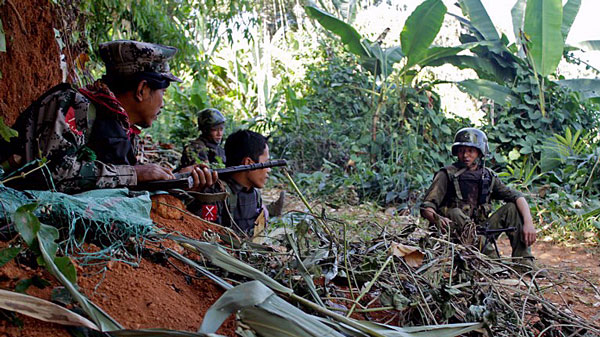Myanmar military asks Kachin rebels to remove outposts in Tanaing region
| Publisher | Radio Free Asia |
| Publication Date | 12 February 2018 |
| Cite as | Radio Free Asia, Myanmar military asks Kachin rebels to remove outposts in Tanaing region, 12 February 2018, available at: https://www.refworld.org/docid/5a9428a53.html [accessed 1 June 2023] |
| Disclaimer | This is not a UNHCR publication. UNHCR is not responsible for, nor does it necessarily endorse, its content. Any views expressed are solely those of the author or publisher and do not necessarily reflect those of UNHCR, the United Nations or its Member States. |
2018-02-12
 Soldiers from the Kachin Independence Army's 3rd Brigade secure an area on Hka Ya mountain in northern Myanmar's Kachin state in a file photo. AFP
Soldiers from the Kachin Independence Army's 3rd Brigade secure an area on Hka Ya mountain in northern Myanmar's Kachin state in a file photo. AFP
Myanmar's military has asked an ethnic militia to remove outposts, including a battalion headquarters, from the Tanaing township gold and amber mining region of Kachin state in the run-up to national peace talks scheduled for later this month.
Myanmar's northernmost state bordered by China and India has been rocked by a resurgence of conflict since 2011 when a 17-year bilateral cease-fire agreement between the two sides broke down. The clashes have left hundreds dead and more than 100,000 displaced.
The latest round of fighting began early this year when government soldiers launched air strikes in Tanaing, an area controlled by the KIA, which relies on its natural resources as a source of income by levying a tax on mine operators.
The KIA believes that Myanmar forces have recently stepped up their attacks on rebel-held territory in hopes of gaining control before a third round of negotiations during a national peace conference later this month.
Despite the hostilities, Lieutenant General Tun Tun Naung, representing Myanmar's military commander-in-chief Senior General Min Aung Hlaing, and KIO chairman General N'Ban La held informal talks in southwestern China's Yunnan province, China, on Feb. 1.
Brokered by China's special envoy for Asian Affairs, the discussions focused on what the two sides could do to move toward peace.
"We can't hold political talks unless we stop fighting, and we heard leaders from both sides discuss that," Colonel Naw Bu, spokesman for the KIA and its political wing the Kachin Independence Organization (KIO), told RFA's Myanmar Service on Monday.
"They came to an agreement on how to position troops from both sides in the area," he said. "We heard this, although we have not been officially told."
The Myanmar army believes that the KIO is conducting illegal business with natural resources in the area of KIA Battalion 14 where recent clashes have taken place, Naw Bu said.
"That's why it asked the KIA to remove the battalion," he added.
The Myanmar government has accused the Kachin rebel group of illegally using the region's natural resources and taking money from mining businesses that should otherwise go to the state.
But removing the outposts and Battalion 14's headquarters may not occur anytime soon, Naw Bu said.
"If we talk politics, we have to stay in our territory until we have an agreement," he said. "The plan to act during the discussion period must made by the technical team," which is responsible for negotiating with the Myanmar army.
"We don't think any side can remove outposts immediately," he said.
HRW weighs in
On Friday, New York-based Human Rights Watch (HRW) called on the Myanmar military to ensure unfettered humanitarian access to civilians in need in Kachin state, five days after 5,000 ethnic Kachins, members of religious organizations, and civil society activists marched in the state capital Myitkyina, demanding an end to the army's offensives and the rescue of people trapped in war zones.
A few thousand miners and their families face food and water shortages because they have been stuck in the Tanaing region and in Sumprabung township during the current round of fighting.
"The embattled civilian population in Kachin state should not be forgotten amid the dire humanitarian situation facing the Rohingya," said Brad Adams, HRW's Asia director, referring to a military crackdown in western Myanmar's Rakhine state that has driven roughly 700,000 members of the Muslim group to safety in Bangladesh since August 2017.
"Both the Burmese army and the KIA should do everything possible to ensure that aid reaches civilians in need," he said.
The KIA is one of several militias with which the Myanmar government is trying to end decades of ethnic separatist civil wars and forge peace in the country through a series of peace negotiations launched in August 2016 by de facto national leader Aung San Suu Kyi.
The KIO has not signed the government's nationwide ceasefire agreement (NCA) that eight of the country's more than 20 ethnic armies inked in October 2015.
Reported by Wai Mar Tun for RFA's Myanmar Service. Translated by Khet Mar. Written in English by Roseanne Gerin.
Link to original story on RFA website
